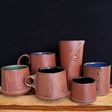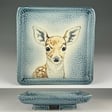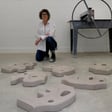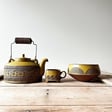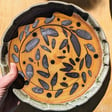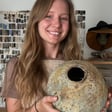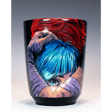Finding Your Pottery Voice
00:00:00
Speaker
real quick before we get started did you know that the questions that we asked are going to determine what our pottery is going to look like and it's going to determine what our voice is going to look like that's why I created 15 questions that you can use right now to start discovering your own unique voice go to shapingyourpottery.com forward slash questions to get this free booklet What if you are simply going way too fast with your pottery? And what if slowing down would actually help you?
Jessie Marinacci Valone on Slowing Down and Mood Boards
00:00:29
Speaker
In this episode, I got to interview Jessie Marinacci Valone, and she talks all about how slowing down helped her tremendously with finding her own voice and making pottery that she could truly call her own.
00:00:39
Speaker
She also talks about creating a mood board to help her get new ideas and find things that inspire her. She also talks about getting around other artists to help her grow and develop new techniques as well.
00:00:53
Speaker
and there's so much more in this episode i hope you guys enjoy it and i see you guys in there If you love pottery and want to take your skills to the next level, you're in the right place. Find your own pottery style right here on Shaping Your Pottery with Nick Torres. Let's get started.
The Importance of Experimentation
00:01:09
Speaker
Jesse, welcome to Shaping Pottery and share with me what is something in the pottery world you believe everyone should be doing.
00:01:16
Speaker
Uh, thanks for having me, Nick. I appreciate it. Something I think everyone should be doing is experimenting and just, you know, having fun in the studio, like try to, you know, don't get stuck in your normal routine. It's easy to do it. And I find myself doing that a lot, but I'm always trying to, you know, push it a little further and try something new. Absolutely great shaping nation. You have to make time to experiment, to play with the clay. Cause that's how you grow. And that's how you get better as a potter. Absolutely love that.
00:01:46
Speaker
So tell them the story, how you got started making pottery.
Jessie's Pottery Journey Begins
00:01:50
Speaker
So I was going to college for graphic design. And as many of you know, if you've been through a BFA program, they make you take electives. So I took in a ceramics class because I'd always been interested. I'd taken a couple classes years prior, but nothing super serious. So I took an elective class with Jane Schellenberger and I was immediately hooked. Like we were doing huge coil built pieces and I was exposed to things I'd never really seen before in the clay world.
00:02:16
Speaker
And you're kind of exposed to the clay world at large. at all right I was at RIC at the time. And so I've made these two huge projects that were very large and challenging, coil building. And I was just hooked. I was constantly in the studio, was driving 45 minutes on a Saturday just to be in the studio, which was kind of my sign. like Yeah, you're spending your free time driving to go play with Clay. Like, I think you found your thing. So talk to her, switch the next semester. And here we are 13 years later. ish After you made those two giant sculpture or coil built pots.
00:02:50
Speaker
yeah I was hooked on like everything you could do with clay because the first one was coil belt and actually the second one was solid construction. So I built it. It was a turtle, a sea turtle. So I built it solid, cut it in half, hollowed it out, put it back together. So just, I don't know the material itself, the processes, like I was just totally fascinated and hooked. I didn't even touch the wheel yet.
00:03:15
Speaker
Just funny. I absolutely love
Penland's Influence on Jessie's Creativity
00:03:18
Speaker
that. So tell me a story about when you attended a residency at Penland School of Craft. So I went down in January of 2020, kind of before, you know, the world kind of turned upside down and I was absolutely blown away. As soon as I pulled in, they have, ah for those of you that haven't been there, they have like 13 craft studios, I think it is. So you're housing with all different artists from different mediums. And then the ceramic studio was just unreal. So it was a self-directed two week residency, but I think there were 20 artists that time. So in the ceramic studio, and I think there were 65 total, maybe something like that.
00:03:54
Speaker
So the second I've been twice, the second time I went was in 2022, so things were a little different, but you're just exposed to so many different artists and equipment, and it's just the most magnificent place. And in the beautiful mountains of North Carolina, you know you're surrounded by a bunch of artists there too. So yeah, it was awesome. How did being around other artists, not just potters, but other artists in general, help you with your own pottery?
00:04:22
Speaker
It makes you look outside your own little box, you know? So you're just constantly inspired by like the way people think and what they're doing with their work and different processes and, you know, just the creativity at large was very inspiring.
00:04:36
Speaker
Absolutely love that shape nation the more you get around other potters other artists The better your pottery is gonna grow because you get new ideas and new perspectives from other people absolutely love that So now what is something you learn during your time here that you still use it today?
Impact of Bisque Molds and Online Courses
00:04:53
Speaker
So it was one of the things that I did take home with me, I made these bisque molds from, they had a ton of bisque molds there that artists have made from like workshops or, you know, just working artists in the past. So I made a bunch of different bisque molds off of their bisque molds that I use to make like my hand built trays that I still use today. And some of them are really big. So.
00:05:13
Speaker
It's pretty cool. I also took an online course with Courtney Martin through Penland during the pandemic. When everything was shut down, she did an online course. So it's kind of through Penland. You know, it wasn't when I was physically there, but I make those that I use that process a lot in my work still to this day. So I don't know if that relates, but kind of. Tell me more about that process you learned during that online course.
00:05:40
Speaker
So she makes these hand-built trays with the base as a slab, and then she makes big coils and pinches the sides up. And then she'll cut out like a handle. So they're very, you know, off the wheel, kind of going back to my roots kind of thing, but still functional. So, and then you carve out the bottom too a little bit if you want to try to get some of the weight out of there. But I've kind of played with different shapes and forms and it kind of just like,
00:06:04
Speaker
made me think a little differently about the process. You know, like you learn one thing, but then you look at, ah you know, it opens the opportunities to make other things, if that makes sense. Absolutely great. Definitely agree. A hundred percent. So let's talk about your pottery. Can you tell me about the moment we when you started making the pottery that you make today?
Refining Pottery Style and Pricing in 2020
00:06:24
Speaker
So 2020 was a big year for me and everybody, right? Good, bad, and in between. So I've always been functional based pretty much since I started, but in 2020, you know, I was kind of forced to slow down. So I just, I started working on my drawing more off the pots and then translated it to the pots. So I started with like a eucalyptus design and it's just kind of.
00:06:47
Speaker
transformed into like this loose botanical, whatever, you know, I feel at the moment kind of thing. And I've been studying plants and like different vines and leaves and flowers and stuff since. So it's kind of shot me in that direction. And I've been working on collaging it with my more like geometric graphic design stuff that I did before. So now I'm kind of trying to blend them together and collage them together, if that makes sense. And the wheel.
00:07:14
Speaker
meshing the wheel thrown with the hand built stuff too. I'm trying to get the hand more visible. So but I would say 2020 is when I started leaning this way and it's just kind of keep kind of been progressing ever since. You mentioned that you were drawing, you're practicing drawing off the pot. Tell me more about then how that helped you with your own pottery.
00:07:35
Speaker
So I started drawing in my sketchbook more, which I've always tried to draw out the pots before I make them. Um, if I'm starting like a new form or something, but I started practicing more like botanical drawings and, you know, just cause then it's this piece of paper, you know, it's not, you're not ruining a pot you spent.
00:07:53
Speaker
hours making so you can kind of work through some things and like work on that layering a little bit. So it just helped with my drawing skills. Cause I used to think I couldn't draw at all and now I'm slowly getting more confident with it, you know? So I'll try, I'll go outside and like sit next to the garden and try to draw different plants. And it's really cool. It's been a cool study to see how the different vines go together and different leaf shapes and stuff.
00:08:19
Speaker
absolutely love that. Shaper Nation, sometimes the best solution for you is to slow down a little bit and maybe prepare what you're trying to actually make and maybe your ideas will come out a little bit better. Right, for sure. So as you've mentioned, you are inspired by nature and design composition. Can you tell me more about this?
00:08:37
Speaker
So I've always been into the nature side of things, but lately it's been this like botanical route. And I grew up with a lot of gardens, like my parents were at our avid gardeners. And this summer I really noticed like a garden's kind of a collage, you know, like you put all these different plants together and if you really sit there and study, they're layered. You know, so you have all these different vines and flowers and everything kind of overlapping. So I'm kind of trying to bring that into the work.
00:09:04
Speaker
How are you bringing that into your own work, the collage part of it? So I've been working on like painting colors with different shapes or lines or whatever. And then I, after I bisque fire, I'll layer on like the black line. That's kind of become really prominent in my work, or I'll draw, I'll paint in like little green leaves and stuff, but I'm kind of, that's kind of the direction I'm heading in. Like I want to start doing like.
00:09:29
Speaker
but's so word i'm thinking of like make some stencils almost and try to layer them up like with colored slip and underglazes and buthima like that kind of thing Something interesting I found from your website is that the physical demands and intellectual choices in my work keep me inspired. I strive
Art and Athletics: A Harmonious Blend
00:09:46
Speaker
to advance my skills as a potter through the process of research, planning, repetition, and experimentation.
00:09:52
Speaker
tell me more about this so i've always been drawn i've always i'm a lifelong athlete so i've always been very physical and i really am drawn to like the physical side of ceramics you know between mixing clay i don't mix clay anymore but you know there is a very physical like body work connection there between the wheel and wedging and you guys know Like if there is a physical aspect to it. And ah before I did ceramics, my hands used to like crave. I used to knit and do puzzles a lot because my hands would just like crave that tactile connection with something. And ceramics, I mean, that's like the perfect fit, right? and Super tactile. So in terms of the physical demands, that's pretty much what I meant. And then the.
00:10:35
Speaker
intellectual choices, I try to think about how the piece is going to be used. And I had an amazing professor, Alfred Linda Secora, who kind of changed how I think about pots and ceramics and really just the world in general. Like she's just a brilliant, brilliant person. And so she kind of changed like, why am I making this piece? Who's going to use it? Like where will it live in the world? You know, like basically why we do what we do. So I try to think about that.
00:11:03
Speaker
when I'm making pieces, like designing pieces especially. when you are How does that process work when you are looking to think about where the pot is going and how you're going to design the pot?
00:11:16
Speaker
So sometimes I'll think like we've, I've done things based around like family rituals, like a family recipe. And I'll think like, what pots can I make that would, you know, work well with this recipe or this ritual or whatever I'm doing. So very briefly, can you walk me through the steps you take when you add your illustrations of patterns onto your pots?
00:11:37
Speaker
Yes. So I pretty much start, I try to make like a blueprint from the start. So if I'm adding on colors that are colored slips, I try to do it on leather hard. and So I'll try to kind of lay out like where I want the lines to go or like a shape. If I'm following the form or if I'm kind of cutting the form up into different sections and then I'll biscuit.
00:11:59
Speaker
And, or I'll do Mishima before I biscuit. I do a lot of Mishima too. Then I'll biscuit and then I'll do my underglaze trailer, or I just got one of those air pens, which is saving my poor hand. So if anybody does a lot of trailing work, highly recommend. And then I'll color in sometimes the leaves or I'll add on a colored glaze.
00:12:18
Speaker
So I'm just kind of trying to layer it, which makes the way it makes sense. And if I do my colored slip after I best get it tends to gunk up the pens. So it just, you know, gives me a blueprint for when you get that whole body of work out of the kiln too, then you're not so overwhelmed. You have a little plan, you know. Love that. Great explanation of that. So let's talk about the business side of pottery. Can you tell me about the moment when you decided to become a full-time potter?
00:12:44
Speaker
So that was the goal from the get. As soon as I graduated, I had a bunch of shows lined up for that year. So I graduated May, I had shows lined up through Christmas. And then I kind of had to do odd jobs in between, you know, for the first few years, especially in the winter, because there's not a lot of shows in the Northeast in the winter. Everything kind of closes down. So I was lucky enough about three, four years in to just hit it full time. And then COVID, you know, kind of picked threw us off for a loop a little bit, but you know limped through and then made it on the other side and thankfully shows seem to be coming back and you know had to pivot a lot but it keeps us keeps you on your toes what would you say has helped you the most with being able to sell your own pottery probably support and encouragement i have um an amazing family amazing husband awesome friends awesome artist friends like i've met so many people along the way that have helped
00:13:41
Speaker
me get, you know, used to the world of shows and being an artist and it's really just the confidence to keep going from the support from them, you know, cause you get down on yourself and it's kind of the roller coaster ride of an artist, right? So some days are easier than others, you know, COVID through a lot of pivots in there, but really I would say that. What is something you wish you knew when it came to promoting your pottery, especially in the beginning of your being a full-time potter?
00:14:10
Speaker
Yeah, that's a tough one. I would say have confidence in the work as I say it with a question mark. It's kind of a hard one for me to answer because I'm not great at promoting. I feel like Instagram changes all the time. So I really hit that one hard, but I guess just have confidence in yourself when you're approaching galleries and shops. And I mean, the worst they can say is no, you know, so just trying new things and seeing what fits, I guess is the best answer.
00:14:37
Speaker
How can someone build build up this confidence to maybe approach galleries or shows? question. I think the like practice makes perfect, right? You know, like just doing it more and more and more and then like not letting it get you down because you know, there is a place for your poverty in the world. Like you're going to find your people and you're going to connect. And that's been one of the, my favorite parts about this career actually is my customers. Like I've made a lot of awesome friends, artists and customers alike that just, you know,
00:15:10
Speaker
renews my faith in the world, honestly, so I guess just doing it and just giving it a try. Absolutely love that. Shaping Nation, you got the more shots you take, the better off you're probably going to be with selling your pottery while you're trying to do a gallery show or even doing it online. Take more shots and just get out there and get a little bit uncomfortable to try to sell your pottery. Absolutely love that.
00:15:35
Speaker
So now, what advice would you give to someone who also wants to have more success selling their pottery? Again, when I try everything, you know, I, I've tried a lot of shows and some of them have been amazing and some of them have been horrible. And, you know, your neighbor may be doing 10 times what you're doing and you're just sitting there with crickets, you know, like it's really dependent on you and that day and there's no like set course. So try everything because sometimes like a little market, we have a lot of wineries here in the Finger Lakes. Sometimes those little markets that are $25 for a day.
00:16:11
Speaker
and they're more profitable than the $600, you know, weekend that I just spent at like a prime well-known art fair. So it's like, just give it a go. You know, if it's a good vibe and it feels like you may, you know, something you'll have fun at, definitely go and give it a try. You know, financial restraints, like you got to be smart about that too. But like for $25, I mean, that was an easy gamble. You know, you you may lose time, but it ended up being amazing. So.
00:16:39
Speaker
I absolutely love that advice. Some excellent advice right there. So let's talk about discovering your voice. Can you tell me about the moment when you knew you were heading in the right direction with your pottery?
Slowing Down to Find Artistic Voice
00:16:49
Speaker
So again, it would go back to 2020 when I was forced to slow down because I'm the kind of personality that wants to go, go, go, go, go and like try everything and make everything. And you really, you can do that, but when you're trying to make a cohesive body of work, it can get kind of, you know, daunting. Like you're just so overwhelmed. Sometimes they can stop doing your tracks.
00:17:10
Speaker
So I think in 2020, when I was forced to slow down and make less pots priced accordingly, like I changed my pricing module then too. So I started charging more for the pieces that I was spending more time on and it ended up working out for me because I was enjoying the work more. So I think since then I've just been kind of trying to.
00:17:29
Speaker
make more pots that I'm excited about. And it seems to be reflecting well with my customers, like they seem to be moving, which is really exciting. So I would say just, you know, try to stay true to what you want to make and see how it's, you know, accepted. I don't know if accepted is the word I want, but see how it's received, I guess. So you mentioned slowing down helped you a lot. What advice would you give to other parties out there that to slow down?
00:17:59
Speaker
So one of the, one of my friends, Sam Alra, that was a penland with me both times, she told me to get off the wheel a little bit because the wheel is so fast, you know, so hand building kind of kicks you out of that. So I only throw like 10 mugs at a time now, because if I, I could throw, you know, 50 at a time, but then I'm not going to be able to finish them the way I want to in that amount of time. It's I'm going to have to rush, you know, so I try to stick to like a 10 to 12 piece match.
00:18:27
Speaker
and then not get ahead of myself in the finishing process because I can throw pretty fast. It's finishing them to the, you know, level that I want to spending the amount of time with them that I want to. So I really just like small batched my work, if that makes sense. Absolutely love that. So now, what would you say was your biggest obstacle when it came to finding your own voice?
00:18:51
Speaker
I feel like I still struggle with this, you know, the whole artist like imposter syndrome thing, but I'm getting better with it. I feel like I'm really enjoying the work I'm making in the last few years. So I feel like I'm finally getting to that point. But like I said, I want to try everything. So it's hard to keep myself focused sometimes, but I have been making like mood boards lately, which have been helping kind of like organize my thoughts. And that's been helping kind of make the work more cohesive.
00:19:21
Speaker
Tell me more about these mood boards that you're creating. Yeah. So i I try to pick different like colors, designs, even like I'll have some, you know, I'll see a picture. I'll go through magazines or like old ceramic monthlies, or I'll research online and print pictures of like, even the vibe I'm trying to get into the work or like where I see the work at the end of it. You know, like somebody sitting on a couch next to a fireplace with a cup of coffee, like but those kinds of things. So it's kind of like a.
00:19:50
Speaker
vision board for your pots, kind you know, so I can, it's not necessarily all pots and it's not necessarily all design. It's just like an overall theme, I guess, of the work. No theme's even the right work, but it helps me stay focused on like, you know, what I'm into right then. but but What advice would you give to someone looking to discover their own unique voice with their pottery?
Experimentation and Mood Boards for Unique Style
00:20:16
Speaker
So keep trying new things. Don't be afraid to experiment in and out of clay. You know, like I said, with the mood boards, like research, research, research, see what appeals to you. I guess that's what the mood boards are. It's like what appeals to me at the time when I'm thinking of like a new collection or design or.
00:20:32
Speaker
just feeling stuck in the studio. Honestly, it helps me get kind of out of my own head a little bit if I just look for inspiration everywhere and then just compile it all into one board. So yeah, go to the library, search online, see what inspires you. And I also have a book that I've done prior to the mood boards that was, I go back to every so often. I made it in school and it's probably an inch thick. It's just like this huge sketchbook with all this stuff.
00:20:57
Speaker
that I was inspired by, sometimes it still applies, you know? So that has been really helpful. Like if I'm ever stuck, that's pretty much what I do. Or I try to go draw, or I took a painting class this winter, which was cool, because that kind of got me out of my, you know, day to day. And yeah, just don't be afraid to experiment, I guess. Absolutely love that advice. Shaping Nation, find your interests and try to put those interests into your party because that's how you find your voice. Absolutely love that.
00:21:27
Speaker
Jesse, it has been wonderful chatting with you today. And as we're coming to a close here, what is one thing you want to hammer home with my listeners today? Just keep going. but Like if you love it and you have a passion for it, I mean, it's not your normal nine to five, you know, if you ever want to go full time, but the benefits outweigh it, in my opinion. Like I can't imagine doing anything else. And if you really love it, just keep going. You'll figure it out. There's so many awesome people at this to help to like ask questions, reach out. Like they're, the ceramics world is awesome. Definitely agree. Jesse, it's been wonderful chatting with you today. Where can my listeners go and learn more about you?
00:22:05
Speaker
So I'm on Instagram and Facebook at jmveseramics and I have a website jmveseramics.com. Thanks for listening to this episode of Shaping Your Pottery with Nick Torres. If you want to start discovering your own unique voice, you must first start with the right questions. That's why I put together a free 15 question booklet for you to start discovering your own unique pottery voice. All you have to do is go to shapingyourpottery.com forward slash questions to get this free booklet.


